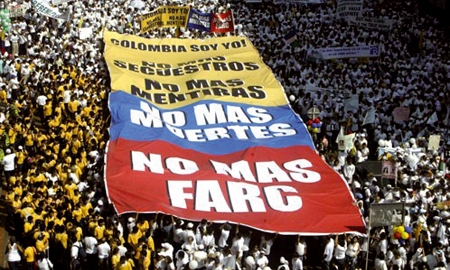
President Juan Manuel Santos, who was Minister of Defense under the Uribe administration, has made it one of his priorities to bring stability and peace to Colombia, and create a safe environment in which to live and invest, by tackling the issue of guerrilla warfare and drug-related violence which has blighted the country for almost 50 years.
As a response to nationwide protests earlier this year and increased government pressure, the country’s largest left-wing rebel group, the Revolutionary Armed Forces of Colombia (FARC), which has been active since 1964, announced its intention to finish its practice of kidnapping for ransom – which for decades had brought cash into the group – claiming it was no longer compatible with the organization’s activities.
This measure comes after President Santos made the release of all kidnapped victims, some of which have been held captive for over a decade, a pre-condition to the possibility of peace talks.
With the group’s leadership in disarray following the deaths last year of FARC leader Alfonso Cano in November and his head of security Alirio ‘The Grandfather’ Rojas Bocanegra five months earlier, as well as continuous air strikes by the U.S.-backed Colombian military impeding the group’s 8,000 fighters from concentrating their forces, the ball currently seems to be in the government’s court, however the administration remains cautious about proceeding with such talks.
Although the FARC’s announcement was widely interpreted as a prelude toward formal talks, the Santos administration knows that the FARC will be extremely wary when negotiating a settlement, given what happened between 2003 and 2006, when right-wing paramilitaries of the United Self Defense Forces of Colombia (AUC) surrendered to the government: many members were subsequently extradited to the U.S. to face drug trafficking charges.
Former President Ernesto Samper, who held office from 1994 to 1998, backs Santos’ decision, claiming that all of the FARC’s hostages must be released before a political solution can even be explored.
Colombian analysts expect some time will pass before Mr. Santos offers the rebels a chance to sit down at the peace table.
Victims’ Law
Colombia’s Victims’ Law, officially referred to as Law 1448 of 2011, was created to compensate the millions of victims of violence committed by left-wing guerrillas and right-wing paramilitaries since 1985, as part of Colombia’s long-running armed conflict.
This law, signed by President Santos in June 2011, complies with the United Nations’ guidelines on the Right to a Remedy and Reparation for Victims of Gross Violations, and contemplates financial compensation for the victims. Former Minister of Interior Germán Vargas Lleras says: “The law is ambitious in the number of Colombians to cover – about 4 million people – as well as in the approach of the land-restitution program and the provision of an integral service to victims of violence... To provide security to people going back to conflict areas as a result of land restitution is a key concern.”
In January 2012, the start of serious efforts at land reform was marked with the distribution among 304 families of the 4,255 hectare country estate of Las Catas in northern Colombia. Each family received up to four hectares of arable land accompanied by the government’s commitment to help increase agricultural output.
Sorting out the rightful ownership of 10 million acres of land will be a monumental task that will certainly take years, but strong advocates such as Mr. Vargas Lleras are confident this process will go down in history as an event as important to the country as the end of apartheid was to South Africans.
1 COMMENT
Sure thing this country is progressing well and the fact there was an agreement on rural matters with the FARC is a miracle!!